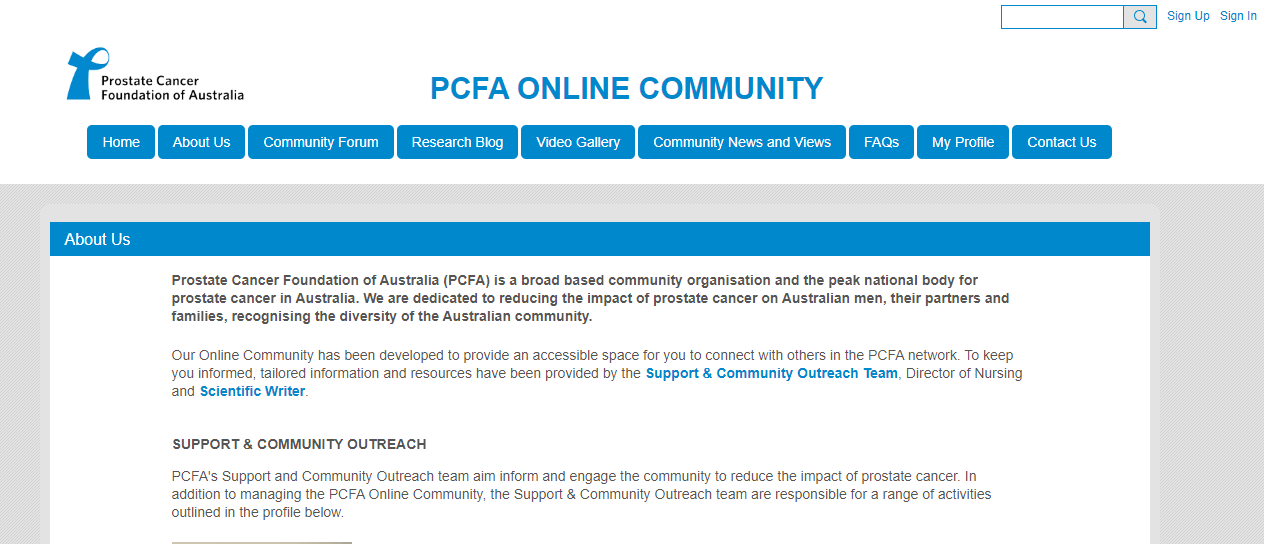PCFA Online Community
July 3, 2019
Several excellent articles have recently been added to the Research Blog of the PCFA Online Community that are useful in understanding prostate cancer, its diagnosis and treatment.
All articles and more can be viewed online at http://onlinecommunity.pcfa.org.au/ once you register (for free).
If you haven’t already signed up to the PCFA Online Community it is easy to do and provides free access to a great range of articles and to the Community Forum where you can share stories, ask questions and offer advice.
- The results of the study assessing the success rate of a new surgical technique to restore sexual function after prostate surgery are now published.
A significant proportion of men experience impotence after prostate surgery. Although there are drugs and devices that can help improve this condition, there remain thousands of Australian men with long-term impotence who are not helped by these options. A new surgical technique is now being performed in Australia to restore sexual function for men who have long-term impotence after prostate surgery.
- European Association of Urology Congress 2019
Side effects from prostate cancer surgery, their treatment and psychological implications were high in the agenda of the European Association of Urology Congress 2019 in Barcelona earlier this year. Following the update last week on a new surgical technique for the restoration of sexual function in men post-surgery for prostate cancer, this week we have brought two further articles on the subject.
- How accurate are websites on focal therapies for prostate cancer?
The internet is a double-edged sword. For men with prostate cancer, the internet is an important source of information for them. It provides information about tests, treatments and clinical trials that is not forthcoming from doctors. But the accuracy of this information is often difficult to assess. This week’s blog describes a study that assesses the accuracy of popular websites about focal therapies for prostate cancer.
- PSA testing for men who have had treatment for an enlarged prostate.
A non-cancerous, enlarged prostate can be treated with drugs to reduce symptoms. Drugs called 5-alpha reductase inhibitors (5-ARIs) reduce PSA levels for these men. This could be problematic, as it could hide the PSA increase caused by a small prostate tumour. Results from a new study in California have suggested that PSA suppression in 5-ARI users was not routinely accounted for during prostate cancer testing, leading to delays in prostate cancer diagnosis and worse outcomes.
- What next when focal therapy for prostate cancer is not enough?
Focal therapies are experimental treatments for localised prostate cancer. Focal therapies destroy small tumours, preserving some of the prostate gland. The aim is to treat the cancer with less side effects than surgery or radiotherapy. But what happens if prostate cancer comes back after focal therapy? Will the focal therapy make subsequent treatment more difficult?
- Antibodies for treating prostate cancer
Researchers have successfully made an antibody to target prostate cancer. This antibody binds a protein called PSMA, found on the surface of prostate cancer cells. It is a “biological tool”, with the potential to be part of a new therapy targeting prostate cancer. This week’s blog explains what an antibody is, and how they are revolutionising cancer therapies.
- Prostate cancer with low PSA
A high reading on a PSA blood test can pick up prostate cancer early. But not all prostate cancers have a high PSA. Some men are diagnosed with an aggressive prostate cancer but still have a very low PSA level. The journey for men whose PSA doesn’t rise with prostate cancer can be considerably more difficult. This week’s blog looks a new research regarding the characteristics of the tumours and outcomes for men with low-PSA high-grade prostate cancer.
- Life after rejecting treatment advice for prostate cancer.
Some men reject their doctor’s recommendations for prostate cancer treatment. They do this for various reasons. Sometimes it turns out well – they avoid over-treatment. Other times it turns out not-so-well. Either way, it’s a difficult decision to make, which has profound consequences for these men and their families. A new study has interviewed 11 Australian men who rejected their doctor’s treatment advice to find out how this decision affected their lives.































